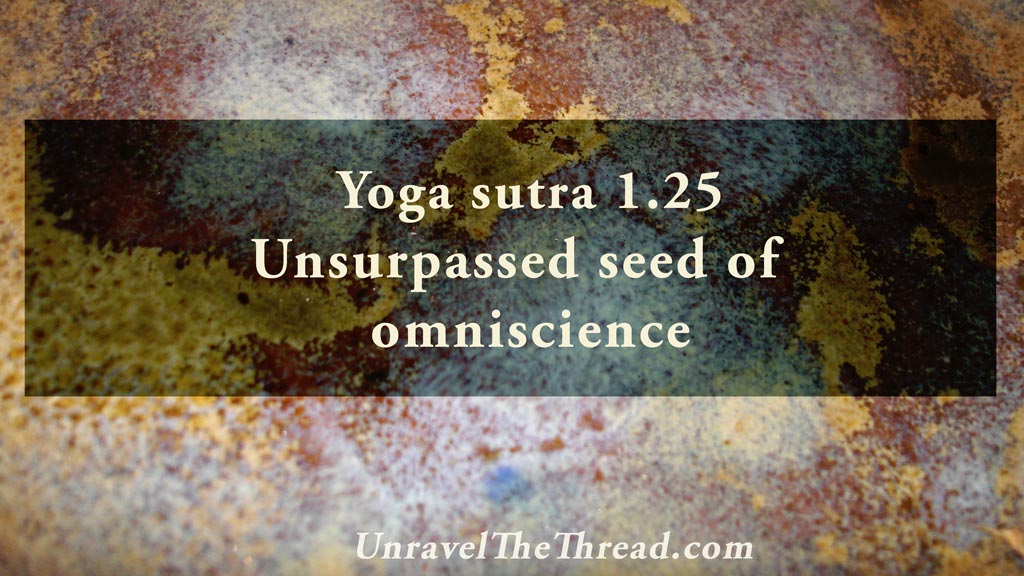
1.23 Surrender the illusion of control
September 6, 2019
1.25 Unsurpassed seed of omniscience
September 20, 2019
1.23 Surrender the illusion of control
September 6, 2019
1.25 Unsurpassed seed of omniscience
September 20, 20191.24 Unaffected by afflictions, actions or effects

1.24 Supreme Being (ishvara) is a special kind of being untouched by afflictions (kleshas), actions (karma), consequences (vipaka) or their impressions.
After offering an alternative path to integration (cultivating our humility by surrendering our illusion of control and acknowledging that there may be a Universal Truth), Patañjali presents in this, and the following sutras, the characteristics of Supreme Being (ishvara), a technique to connect to ishvara and the effects of using that technique. Verse 1.24 says that Supreme Being is different from other beings. Supreme Being is not affected by pain and hardship, by actions, their effects or any of their remaining impressions. Exploring these ideas is a fertile ground to disentangle some of your beliefs and personal baggage associated with the ideas of life, purpose and God. A useful starting point is contemplating which word or words would be best for you to relate to the idea of ishvara. In this interpretation ishvara is rendered as Supreme Being. Other potential words could be Truth, Love, God, Life, Pure Awareness, Pure Being, Source, Spirit. Is there one word that feels more meaningful to you? Explore your responses and reactions to this question. Then take whichever word resonates with you and contemplate how that word/concept relates to the notions of affliction, action, consequences and impressions. What do you discover? Can you think of something that is not influenced by obstacles, actions or their effects? Is there anything that can be free of regrets and expectations?
Additionally, you can try to engage in a simple experiment over the next five days. On the first day set your intention to notice if you are experiencing any afflictions in the form of grief, trouble, hardship, distress, pain or anger. What do you notice? Do you know anything that is not affected by any afflictions? On the second day, focus on your actions and notice if you are affected in any way by your actions. To what extent do your intentions and actions manifest in your body, mind, breath and emotions? How do you act? Are your actions influenced by your circumstances and environment? What are your mood and attitude as you act? Are your actions skillful? On the third day pay attention to effects and consequences. Can you trace the causes of the experiences that you are having? To what extent are your experiences influencing your internal activities and mood? Is your mood influencing your experiences? When you sensitize yourself to your reactions, are your reactions automatic or impulsive? Are you responding in conscious, wholehearted and deliberate ways? On the fourth day you can focus your awareness on the impressions left by your irritations, actions and reactions. What do you notice? Does it ever happen to you that you feel annoyed or frustrated by no apparent reason? Can your mood be a remnant of something beyond your conscious awareness? On the fifth day of your experiment you can reflect on your previous days. You can zoom out of your immediate level of experience to reflect on the potential connections between your afflictions, actions, reactions and impressions. Quite likely you will notice that some of your experiences vary according to your circumstances. Do you notice any trends? Can this process help you uncover some of the irritants that tend to generate more pain, reactivity and regret or resentment? Are some of these irritants the buttons that other people activate in you, quite often unintentionally? Are there ways for you to deactivate these sources of grief and anguish?
After your experiment, return to the idea of ishvara. Are you unaffected by afflictions (kleshas), actions (karma), consequences (vipaka) or their impressions? Can you be open to the possibility that there may be something, some aspect of existence, that remains free of influence from these factors?
As usual, one more way of exploring the meaning of this sutra is by chanting it.
You can choose to chant it in its traditional form with some of the words coming together:
1.24 kleśa karma vipākāśayaiḥparāmṛṣṭaḥ puruṣaviśeṣa īśvaraḥ
क्लेश कर्म विपाकाशयैःपरामृष्टः पुरुषविशेष ईश्वरः ॥२४॥
Another option is to chant each word in the sutra individually:
- kleśa
- karma
- vipāka
- āśayaiḥ
- aparāmṛṣṭaḥ
- puruṣa
- viśeṣaḥ
- īśvaraḥ
Unravel the thread is now available as a book!
If you find Simple-Yoga.org and Unravel the thread useful, consider supporting my labor with a donation, you may also donate using PayPal or Venmo. Thank you!
